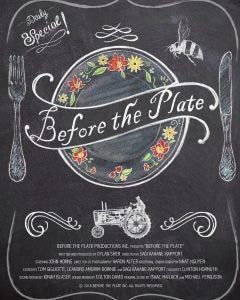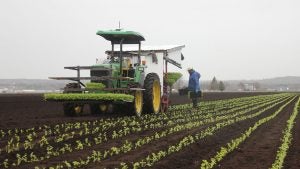A film about the 10 ingredients that will help change the way the public looks at farming.
This is the way food — and filmmaking — should be.
Before The Plate is a genuine and passionate documentary that encourages everyone to be more engaged with the source of their food. It laments the modern disconnect between farmers and the public, but doesn’t see it as an unrepairable relationship. Like all relationships, it will require work and communication on both sides, but the film embraces, and even nurtures, the idea that we can all learn more about our food system.
Before The Plate follows 10 ingredients from a dish selected by John Horne, the head chef at Toronto’s upscale Canoe, a restaurant that celebrates the food native to Canada. Horne visits the various farms that contribute the food for this meal — a deliciously enticing larded beef tenderloin, charred onions, honey-roasted carrots, tater tots, green-tomato chutney, and bread sauce — and helps to put a personal face on each growing operation.
It’s Horne’s authentic curiosity that propels Before The Plate forward. He asks questions, both broad and nuanced, and is fascinated by so many farm facts — from the oil in sunflower seeds and the longtime waste of undersized carrots to the hefty penalties for having traces of antibiotics in milk to a large greenhouse’s incorporation of CO2 byproduct from a nearby ethanol plant. It was clear that he was on a journey of discovery and that his revelations about agriculture could be your revelations or the revelations of any member of the public.

Yet while this was a film about food and Horne’s journey, it was also about telling the stories of individual Canadian farmers. Each section of Before The Plate, which premiered to a packed theater of almost 500 people in Toronto, is built to be informative, to be connective. Made largely with Kickstarter funding and with the support of the University of Guelph’s Ontario Agricultural College, which is where Before The Plate creator Dylan Sher was a student, this is a film without villains, only food heroes. You won’t see the names of any controversial ag figures or companies mentioned here — in fact, it gains much more of an everyman quality by its use of regular farmers.
Before The Plate is a serious documentary as a whole, but it has plenty of lighthearted moments. It’s also upbeat about the potential and future of food production, where technology and innovation can contribute to even better efficiency and food safety.
This is the kind of documentary that can stand on its own for viewers. While people already deep in the ag industry may be aware of how some of the featured products are grown and raised, for the general public, this film will be enlightening. It would be a good fit in a school classroom, as a valuable tool to expose youngsters to how agriculture works.
Because Before The Plate features farms both big and small, both conventional and organic, both crop-based and livestock-based, it creates a multitude of discussion and educational opportunities for people to draw off of. Just watching it, there is a sense that each one of us, no matter where we live, can be informed about our food.

So many documentaries made today have agendas, whether overt or subtle, that make specific claims about some of the most contentious aspects of agriculture. It’s difficult to stay above the fray, and we’ve grown accustomed to assuming every film has motives. Before The Plate brings balance, objectivity, and openness to the big screen — it’s agenda, if that’s the right term, is to be informative and promote important food discussions. More than that, it compels them.
Sher, the project’s creator, admits that he grew up as a city kid with little exposure to agriculture before getting to college. His goal with this documentary was to tell the story of today’s food roots, a complete story that shows how everyone can have a place in its success. It lays the foundation of understanding and encourages an examination of how we do things in our food system — how we grow our food and how we grow as a food industry.
Ryan Tipps is the founder and managing editor of AGDAILY. The Indiana native has a master’s degree in Agriculture and Life Sciences from Virginia Tech and has covered the food and farming industries at the state and national levels since 2011.



